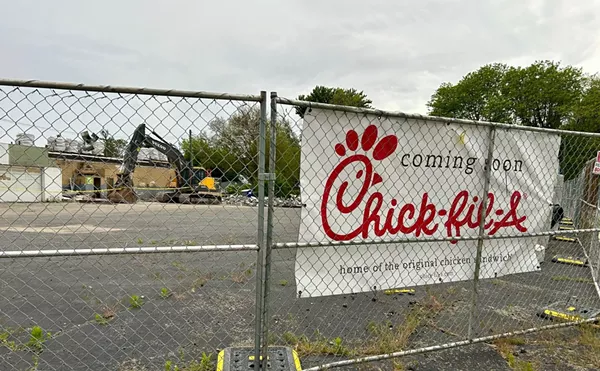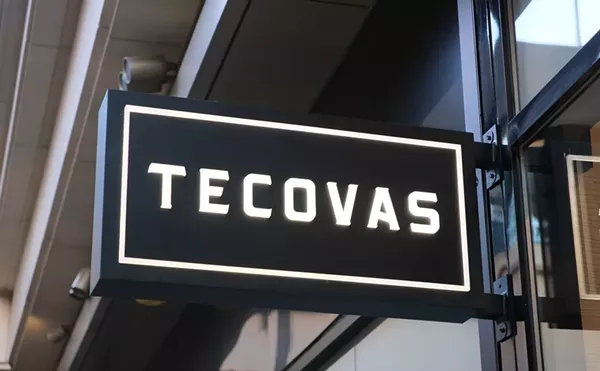
Audio By Carbonatix
[
{
"name": "GPT - Leaderboard - Inline - Content",
"component": "35519556",
"insertPoint": "5th",
"startingPoint": "3",
"requiredCountToDisplay": "3",
"maxInsertions": 100,
"adList": [
{
"adPreset": "LeaderboardInline"
}
]
}
]
The issues didn't matter when he first volunteered on a political campaign in the 1950s. As a 6-year-old, David Bonior passed out literature for a candidate he doesn't really remember along Joseph Campau Street in Hamtramck for potato chips and pop.
This time around, the former Michigan congressman from Macomb County makes it clear that the presidential contender he's working for as national campaign manager has the best agenda he's seen in more than 50 years of stumping for Democrats.
That candidate would be John Edwards, the former U.S. senator from North Carolina who unsuccessfully ran with John Kerry in 2004 as the vice presidential nominee after failing to win the spot atop his party's ticket.
With the first presidential primary in Iowa still 51 weeks away, one overarching question is whether Bonior's long-established ties with organized labor will help Edwards reap union endorsements — and the valued resources, volunteers and connections that come with labor's stamp of approval.
Taylor Dark III, an assistant professor of political science at Cal State University Los Angeles, studies the nexus between labor and politics in presidential campaigns. He says Bonior's connections "are certainly going to help" Edwards, but he predicts a splintering of union support during the primary.
"There really isn't a single consensus front-runner at all," Dark says.
Talk politics
When Bonior calls John Edwards his ideological "soul mate," there's reason to believe he's doing more than spouting rhetoric. Both have strong records of assisting the working class while in office and out. Both support a national health care system. Both are outspoken in their opposition to the Iraq war, calling on Congress to block funding of Bush's plan to raise troop levels, saying America should begin a phased withdrawal now.
And both have launched nonprofit groups to work to promote economic justice and advancement. Bonior launched the nonprofit group American Rights at Work. It advocates for workers and their right to organize into unions. Edwards helped set up the Center on Poverty, Work and Opportunity at the University of North Carolina-Chapel Hill. The center, as part of the law school, focuses on the needs of people living at or below the poverty level, raises awareness of related issues and publishes research.
"I've watched what he's done since he's left office and certainly he not only talks the talk but walks the walk," Bonior says.
Bonior's own work since leaving office is similar. He served in Congress from 1976 until 2002, representing a district that included parts of Macomb and St. Clair counties. He was the majority whip for two terms and minority whip for three terms with a consistent record of supporting organized labor's agenda.
In 2002 he didn't run for Congress after Republican gerrymandering put him in a district where he would have faced fellow Democrat Sander Levin. Bonior ran for governor instead, losing his party's nomination to Jennifer Granholm.
After that, he joined the faculty at Wayne State University, where he's a professor of labor studies (he's on a leave of absence for the duration of the Edwards campaign). He also directed American Rights at Work and worked as an adviser to Edwards' political action committee, the One America Committee.
In the 2004 presidential primary, Bonior first backed former House Minority Leader Dick Gephardt, D-Mo., and co-chaired his national campaign until Gephardt bowed out of the race. Bonior then threw his support to Edwards, campaigning for him nationally during the primary season.
It's the issues
While still in Congress in 2002, Edwards voted for the war. But now he's vigorously opposing it and focusing on traditional, liberal domestic policies in his campaign.
Meanwhile, he faces the prospect of strong opposition. Sen. Hillary Rodham Clinton, of New York, and Sen. Barack Obama, of Illinois, have announced the formation of exploratory committees and are expected to soon launch full-fledged campaigns. New Mexico Gov. Bill Richardson announced formation of an exploratory committee on Sunday.
Still, with Bonior's history in labor, he brings strong ties to the Edwards' campaign the other candidates may not have.
Not that Edwards hasn't forged alliances himself through his relationships, policies and platforms. Mark Gaffney, president of the 600,000-member Michigan AFL-CIO, says he's "under orders from headquarters" not to endorse 2008 presidential candidates.
But Gaffney did say "unions would be incredibly stupid not to go with John Edwards."
During the 2004 campaign, Edwards shored up Kerry's otherwise negligible union constituency, Gaffney says. And with Edwards' current focus on the retention of manufacturing jobs and universal health care, for example, he's got a bigger base of union support than he did four years ago, according to Elizabeth Faue, a Wayne State University professor who studies labor history.
"Bonior would help him enhance those credentials and bring to him union resources, especially political resources like phone banks and volunteers, invaluable in the early, underfunded days of a presidential campaign," Faue says.
But, aside from the certainty they'll be supporting a Democrat for president in 2008, it's not clear what unions will be doing between now and then, says Dark, the California political scientist who wrote the 1999 book The Unions and the Democrats.
Primary endorsements definitely aren't a given, Dark says.
"My general feeling is that the logic of the situation for a lot of the unions might be to wait and see which one candidate is going to emerge at the forefront and maybe jump on the bandwagon a little later on," Dark says. "It's a hard political calculation."
Bonior's part
In his new role with the Edwards campaign, Bonior will oversee fundraising. He's already started showing his effectiveness, says Jennifer Palmieri, Edwards' press secretary.
With a subject line of "Total Bull," a Bonior message hit e-mail inboxes last week. He debunked President Bush's recent statements that Congress can't stop the president's proposed escalation of troop levels in Iraq.
"That's bull," Bonior wrote, in bold type. "I served in Congress for 26 years, and I can assure you that Congress does have the power to stop this escalation — and it has used that power many times before, including in Vietnam, Lebanon, Nicaragua and Colombia."
Asking supporters to help fund an ad aimed at urging Congress to stop the president's action, his e-mail message raised tens of thousands of dollars, according to Palmieri, who wouldn't give exact figures but called it the most successful e-mail among dozens Edwards and his political action committee have sent.
Bonior, for his part, says he'll continue to send e-mails or do whatever's needed with the campaign as he splits his time between the Edwards North Carolina campaign office in Chapel Hill and his own nonprofit's headquarters in Washington, D.C. The campaign machine has staff to be hired, policy papers to be drafted, departments to be coordinated, strategies to be brainstormed, and funds to be raised.
"You name it, it crosses my desk," Bonior says. "It is managing a business and managing people for a purpose, and that purpose is to get John Edwards elected president. It's not a job, it's a cause."
Sandra Svoboda is a Metro Times staff writer. Contact her at ssvoboda@metrotimes.com or




